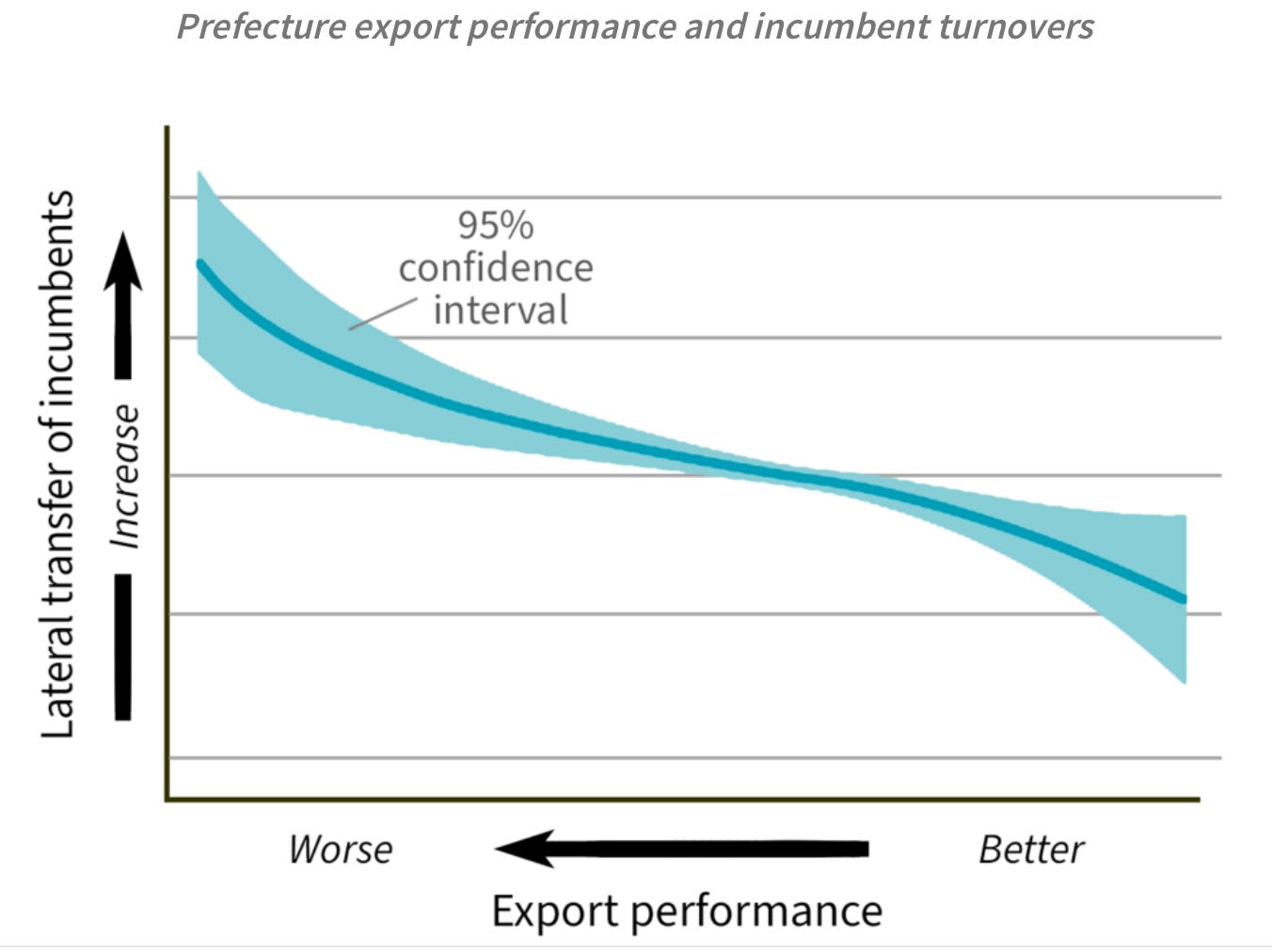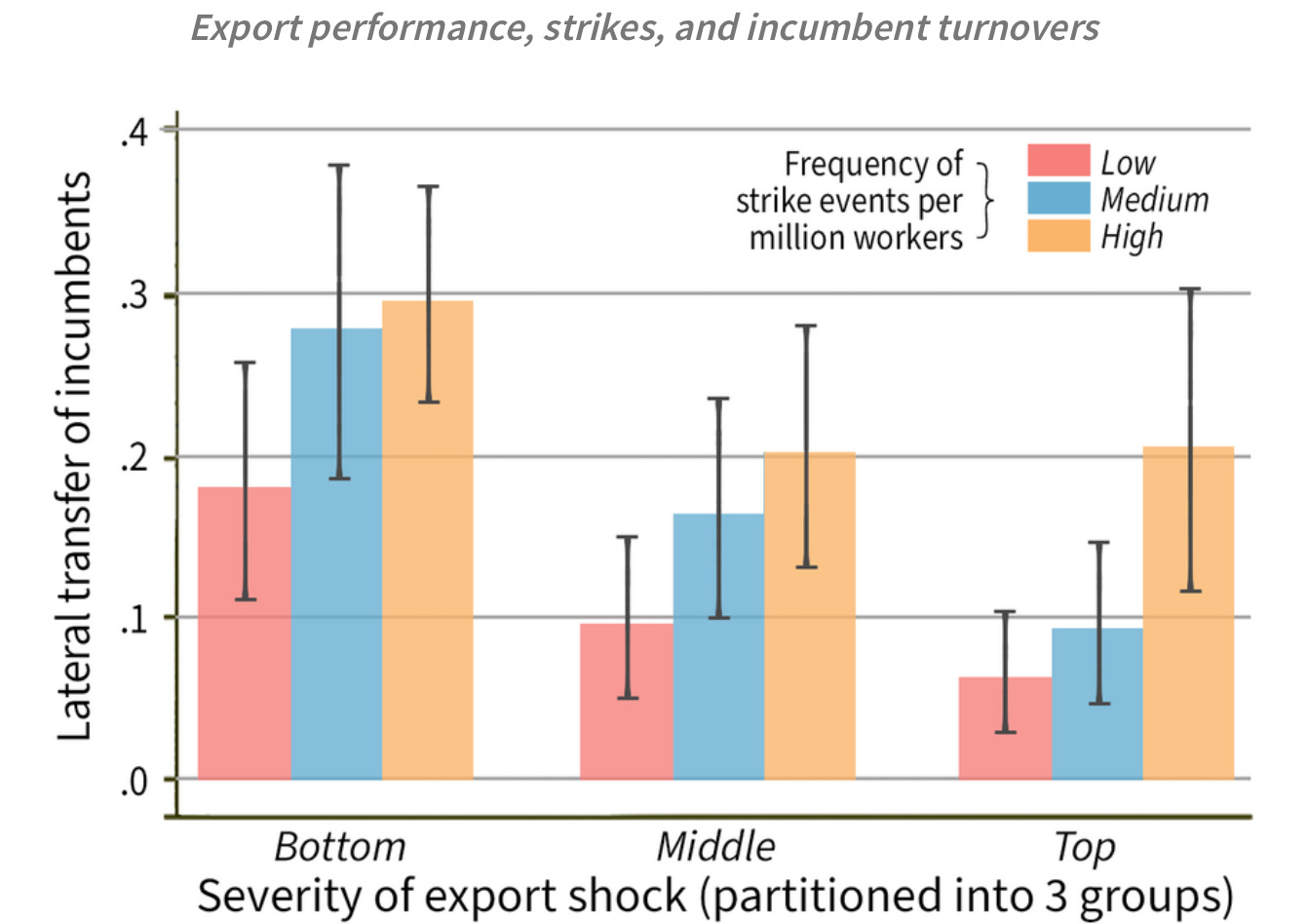How China’s Political System Responds to Social Unrest in Economic Slowdowns
How does China keep local officials accountable in managing social unrest triggered by economic slowdowns?
INSIGHTS
A nationwide analysis of China’s export slowdown between 2013 and 2016 reveals that prefectures that experienced a more severe export shock witnessed a significant increase in incidents of labor strikes.
The prefectural party secretary was more likely to be replaced by the central government if the rise in strikes in her prefecture was greater than in other prefectures that saw comparable export slowdowns.
A negative shock to a prefecture’s exports was also associated with increased usage of the phrase “maintaining social stability” in government work reports and a rise in local public security and social spending.
Evidence suggests that the central government incentivizes incumbent local leaders and, in particular, younger officials whose career aspirations are stronger, to exert appropriate effort to maintain social stability.
Source Publication: Filipe R. Campante, Davin Chor, and Bingjing Li (2023). The Political Economy Consequences of China’s Export Slowdown. Journal of the European Economic Association.
Negative economic shocks often have repercussions for domestic political outcomes. Relatively little, however, is known about how China’s authoritarian regime, which also exhibits strong state capacity, manages its local officials to best respond to social unrest that can arise from weak economic conditions. Leveraging the decline in China’s export performance from 2013 to 2016, new research explores how the upper-level government incentivizes local prefectural officials to contain social instability generated by negative export shocks.
The data. To assess the relationship between export slowdown and labor strikes, researchers measured the performance of China’s manufacturing exports from 2013 to 2016 using data from China’s General Administration of Customs, which covers the universe of China’s exporters and importers, their location, and a record of their trade flows. Data on strikes was collected from the China Labor Bulletin, which includes information on the strike date, prefecture, a short incident description, and usually, the cause of the strike. Finally, socioeconomic variables were obtained from the China City Statistical Yearbooks and supplemented with night lights intensity data from the VIIRS-DNB dataset — a commonly-used proxy for economic activity. Survey-based income data from the China Panel Family Studies were used to compute additional local outcomes.
Next, to analyze the extent to which export performances impacted the career trajectories of 544 individuals who each held the position of prefecture party secretary at some point between 2013 and 2016, researchers gathered their biographical information and career histories from their CVs maintained by People.cn, an official website affiliated with the Chinese government. Then, researchers examined two sets of variables to measure how local officials managed social instability in the wake of an export slowdown. First, researchers performed textual analyses of prefecture work reports, an official speech delivered on an annual basis, to examine how often party secretaries used phrases — most notably, “maintaining social stability” (weiwen, 维稳) — that traditionally signal the importance of domestic law and order as a political priority. Second, researchers analyzed the fiscal responses of local incumbents, using data on prefectural government expenditures for public security and social spending collected from local statistical sources.
Export slowdowns cause increasing labor strikes. Researchers found that a one standard deviation increase in the export shock, amounting to roughly US$841 decrease in exports per worker, translated into a 16% increase in the number of strikes compared to the median occurrence of strikes. Strikes arose over wage arrears or layoffs across both the manufacturing and non-manufacturing sectors, but the effect was much larger in the manufacturing sector.
The determinants of prefectural party secretary turnovers. The researchers also found that, on average, prefectures hit by more adverse export shocks also witnessed an increased likelihood of incumbent turnovers. More precisely, a one standard deviation increase in the severity of the export shock increased the likelihood of an official being laterally transferred by 7.6 percentage points — a sizeable increase given that the average rate of such turnovers was typically 16.3%.
According to the research, in addition to the severity of export slowdowns, a local official’s performance in managing labor unrests was also determinative of her likelihood of being de facto demoted (i.e., being laterally transferred within 3 years of her tenure). In prefectures where exports took comparable hits, party secretaries that saw larger increases in labor strikes under their watch were more likely to be laterally transferred. In other words, the turnover resulted, in part, from a negative evaluation of the local leader's handling of the labor strike situation relative to party secretaries in other prefectures who were subject to similar export shocks. Such findings suggest that the central government does not simply rely on absolute numbers of labor unrests to sideline or retain local officials but rather strategically evaluates local incumbents based on their ability to effectively manage labor strikes compared to their peers who face similar levels of instability in other prefectures.
Social stability management. Researchers found that, on average, incumbents who were exposed to very negative export shocks displayed larger concerns with stability, as reflected in their increased usage of weiwen (or social stability) in the prefecture work report. Similarly, a one standard deviation increase in export shock (amounting to roughly US$841 decrease in exports per worker) prompted a 2% increase in public security spending and a 1.7% increase in social spending. However, measures to bolster social stability varied according to the strength of the officials’ career concerns: stability measures were most intense among younger party secretaries (under the age of 57), but tapered off for officials nearing the mandatory retirement age of 60.
These findings, researchers suggest, underscore the political importance to local incumbents of upholding social stability when economic conditions deteriorate. Local government emphasis on weiwen and fiscal spending on public security further suggest that a key criterion for the career advancement of local officials is to maintain social stability, as opposed to solely boosting economic growth. The research also suggests that the central government strategically leverages such local leaders’ career concerns to keep them focused on maintaining social stability.
“Political accountability with Chinese characteristics.” This study highlights how the central government places considerable significance on local leaders’ ability to deliver social stability. But its ability to evaluate local leaders also displays a level of sophistication. By factoring in the severity of export slowdowns and comparatively assessing local officials and their ability to manage labor unrests, the central government incentivizes local officials to exert effort to contain social instability. Taken together, the evidence suggests that the central government requires deft management of social tensions by local leaders, while itself being deft in its evaluation of these officials.





